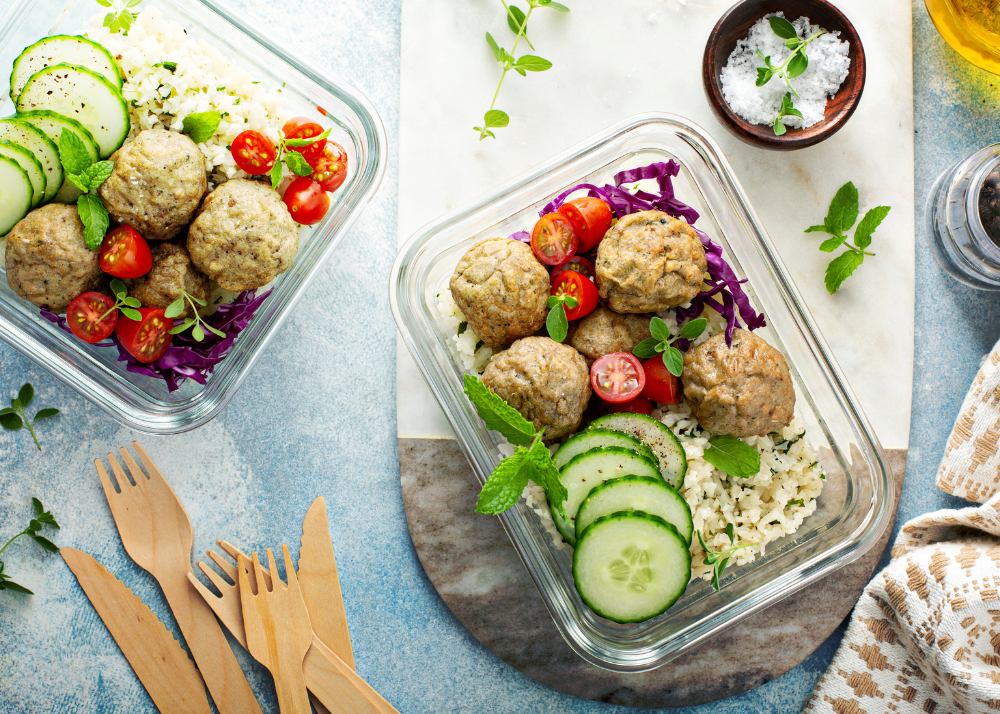College meal prep is a game-changer for students juggling classes, assignments, part-time jobs, and a social life. Without a plan, it’s easy to fall into the cycle of overpriced takeout, dining hall boredom, or skipping meals altogether.
From our experience, having ready-to-go meals saves time, money, and stress while helping students stay energized and focused. After putting it to the test, we know that meal prepping doesn’t have to be complicated—even with a tight budget, limited kitchen space, or a packed schedule.
This guide covers simple meal prep ideas, tips for keeping meals balanced, budget-friendly shopping strategies, and practical ways to make meal prepping work in any college setting. With a little planning, it’s possible to eat well, save money, and take control of meals without spending hours in the kitchen.
Meal Prep Ideas For College Students
Starting college meal prep doesn’t have to mean spending hours in the kitchen or using complicated recipes. Keeping things simple is the key to success.
The best meal prep ideas are affordable, require minimal ingredients, and don’t need fancy equipment. With just a little planning, it’s easy to do meal prep for one person that’s delicious, nutritious, and ready when you need it.
Overnight Oats
For students who struggle to fit breakfast into their routine, overnight oats are a fantastic option. They’re also excellent for family meal prep. They require no cooking and take less than five minutes to prep. In a jar or airtight container, combine rolled oats with milk or a plant-based alternative.

Add a spoonful of peanut butter, a handful of banana slices, or some chia seeds for extra nutrients and texture. Let it sit in the fridge overnight, and by morning, the oats will be soft and ready to eat.
The best part? There are endless variations. Try mixing in cinnamon, vanilla extract, berries, or a drizzle of honey for extra flavor.
DIY Burrito Bowls
Burrito bowls are one of the easiest and most budget-friendly meals to prepare. They’re completely customizable, making them a great option for students with different dietary needs. Cooking a big batch of rice at the beginning of the week is a smart move since it can be used in multiple meals.
For a lower-carb version, cauliflower rice works just as well. Add black beans for fiber and plant-based protein, along with grilled chicken or tofu for an extra protein boost.
Top it off with salsa, shredded cheese, avocado, and a sprinkle of cilantro for flavor. Everything can be stored in individual meal prep containers, making it easy to grab one on a busy day and heat it up in minutes.
Sheet Pan Chicken & Veggies
A one-pan meal like sheet pan chicken and veggies is perfect for students who want something filling without a lot of dishes. Simply toss chicken breast, bell peppers, zucchini, and potatoes in olive oil and seasonings like garlic powder, paprika, and salt.

Spread everything on a baking sheet and roast at 400°F for about 25 minutes. Once cooled, divide into containers for easy, protein-packed meals throughout the week. This method works with any protein and veggie combination, so mix it up with whatever’s on sale or in season.
DIY Instant Noodle Cups
Instant noodles are a college classic, but homemade versions are healthier, tastier, and just as convenient. In a large mason jar or meal prep container, layer cooked noodles, pre-cut vegetables like carrots and bell peppers, and shredded chicken or tofu.
Add a bouillon cube or spoonful of miso paste for flavor, along with soy sauce, sriracha, or sesame oil for an extra kick. When it’s time to eat, simply pour in hot water, stir, and let everything sit for a few minutes. It’s a quick, satisfying meal that requires zero effort during the week.
Freezer Breakfast Sandwiches
Mornings can be hectic, but having a ready-to-go breakfast makes all the difference. Freezer breakfast sandwiches are high in protein and easy to make in batches. Start by scrambling eggs and layering them onto whole-grain English muffins with cheese and turkey bacon.
Once assembled, wrap each sandwich in foil or parchment paper, then store them in a freezer-safe bag. When it’s time to eat, unwrap and microwave for about a minute. These sandwiches can also be customized with sausage, spinach, or avocado for variety.
Peanut Butter Banana Smoothie Packs
Smoothies are an excellent way to get nutrients on busy mornings or after a long day. Prepping smoothie packs in advance makes blending even faster.
In freezer bags, portion out sliced bananas, a spoonful of peanut butter, a scoop of protein powder, and a handful of spinach.

Seal the bags and store them in the freezer. When it’s time to make a smoothie, just dump the contents into a blender, add milk or water, and blend until smooth. These are especially great for students with early morning classes who need something quick and filling.
Greek Yogurt Protein Boxes
For students who need quick and easy snacks, Greek yogurt protein boxes are a great solution. These require no cooking and are packed with protein to keep energy levels up between classes. Simply portion Greek yogurt into individual containers and add a side of granola, fresh berries, and nuts.
To prevent the granola from getting soggy, store it in a separate small container and sprinkle it on right before eating. This is a great alternative to sugary snack bars and is just as easy to take on the go.
Why Should You Meal Prep as a College Student?
Meal prepping is one of the best ways for students to save time, money, and energy. Cooking every day can be overwhelming, especially with a busy schedule, but having meals ready to go makes life easier.
From our research, students who meal prep regularly spend less money on takeout and eat healthier meals that help them stay focused. It also reduces stress by eliminating the need to figure out what to eat at the last minute.
Plus, when meals are prepped in advance, less time is spent cooking during the week, leaving more time for studying, socializing, or relaxing.
How Do You Meal Prep for the Week as a College Student?
The best way to meal prep for the week is to start with a simple plan. Create a basic menu, write out a grocery list, and stick to it when shopping.

Cooking in batches is a huge time-saver—making large portions of grains, proteins, and veggies ensures meals are ready to mix and match throughout the week. Investing in good-quality, microwave-safe meal prep containers keeps food fresh and easy to transport.
If space allows, using a mini fridge or freezer is a great way to store prepped meals and ingredients for longer. Don’t forget snacks! Keeping quick, healthy options like granola bars, nuts, or protein bites on hand makes it easier to avoid vending machine runs between classes.
What’s the Best Way to Prepare Balanced Meals?
A balanced meal includes a mix of protein, grains, vegetables, and healthy fats. Good protein sources include chicken, eggs, tofu, and beans, while whole grains like quinoa, brown rice, and whole wheat pasta provide long-lasting energy.
Vegetables such as spinach, bell peppers, and carrots add essential nutrients, and healthy fats from avocado, nuts, and olive oil help keep meals satisfying.
To make meal prep easier, pre-cut vegetables and batch-cook grains ahead of time, so putting meals together takes just minutes. With a little planning, eating well in college becomes much more manageable.
College Student Meal Prep Tips
With a few smart strategies, it’s possible to eat well without spending hours in the kitchen. From our experience, students who keep their meal prep simple, budget-friendly, and flexible find it much easier to stick with it.
These tips will help make the process more manageable, whether you’re cooking in a dorm room, a shared apartment, or a small kitchen:
Keep It Simple
The best meal prep strategy is to stick with easy, no-fuss meals. Recipes that require minimal ingredients and steps save time and reduce stress. One-pot dishes, sheet pan meals, and no-cook options are perfect for busy students.

Cooking a large batch of pasta with a simple sauce or roasting chicken and vegetables on a sheet pan takes little effort but provides multiple meals for the week. Keeping things simple means less time cooking and more time focusing on school, work, and social life.
Buy In Bulk
Buying staple ingredients in bulk is a smart way to save money and make meal prep more efficient. Foods like rice, beans, frozen vegetables, oats, and pasta are much cheaper when purchased in larger quantities.
These items also have a long shelf life, so they won’t go to waste. Many warehouse stores, discount grocery chains, and online retailers offer bulk options that fit within a student budget. If storage space is limited, consider splitting bulk purchases with roommates or friends.
Use Multipurpose Ingredients
When planning meals, focus on ingredients that can be used in multiple ways. This saves money and prevents food waste. For example, grilled chicken can be used in salads, wraps, and rice bowls throughout the week.
A big batch of quinoa can be a base for different meals, from a breakfast bowl with fruit to a savory lunch with roasted vegetables and protein. Versatile ingredients make meal prep more flexible and prevent meals from feeling repetitive.
Invest In A Slow Cooker Or Instant Pot
A slow cooker or Instant Pot can be a game-changer for college students. These appliances allow for hands-off cooking, meaning you can throw in ingredients, set a timer, and let them cook while studying or relaxing.
A slow cooker is perfect for soups, stews, and shredded meats, while an Instant Pot speeds up cooking time for grains, beans, and proteins. Both options make batch cooking easier and eliminate the need for constant monitoring.

Don’t Forget Snacks
Having healthy snacks on hand can make a big difference, especially during long study sessions or busy days on campus. Prepping snacks like hard-boiled eggs, yogurt with granola, or homemade trail mix can help curb hunger and keep energy levels steady.
Keeping snacks ready to go makes it easier to avoid vending machine runs or expensive campus food. High-protein snacks like Greek yogurt, nuts, and cheese sticks are great options for staying full and focused.
Get Professional Guidance
If meal prep feels overwhelming or you’re unsure about balancing meals properly, connecting with a Registered Health Dietitian can be a huge help.
At Berry Street, we offer access to Registered Dietitians who are covered by insurance and can provide personalized meal-planning advice, budget-friendly nutrition tips, and strategies to make meal-prepping work for your lifestyle.
Whether you need help with food choices, portion sizes, or dietary restrictions, working with a professional can make meal prep easier and more effective.
How To Budget For College Meal Prep
Set A Weekly Budget
Before heading to the grocery store, decide how much you can realistically spend on food each week. Having a set budget keeps spending in check and helps avoid impulse purchases.
Once you determine your budget, try to stick to it by making a meal plan, creating a grocery list, and only buying what you need. All of our Registered Dietitians, such as an intuitive eating Dietitian, can help you create a personalized 7-day meal plan. Keeping track of food expenses over time can also help adjust the budget if needed.
Shop Smart
Grocery shopping on a budget is all about making smart choices. Generic brands are often just as good as name brands but cost significantly less.

Many grocery stores also offer digital coupons and discounts through their apps, making it easy to save money on essentials.
Shopping at budget-friendly stores or local discount markets can also stretch your food budget further. Planning meals around sales or bulk deals helps maximize savings while ensuring a variety of affordable ingredients.
Reduce Food Waste
Only buy what you need and plan meals around ingredients you already have. Freezing leftovers in portioned containers is a great way to prevent food from going bad while also ensuring easy meals for busy days.
Get creative with ingredients—use leftover roasted vegetables in omelets, repurpose rice into a stir-fry, or turn extra chicken into a wrap for the next day. Being mindful of food waste not only saves money but also makes meal prep more sustainable.
Benefits Of Meal Prep For College Students
Saves Money
Eating out regularly adds up quickly, but meal prepping helps keep food costs under control. A homemade burrito bowl with rice, beans, chicken, and veggies costs under $3 per serving, while a takeout version can easily be $10 or more.
Prepping meals in advance allows students to buy ingredients in bulk, take advantage of grocery store sales, and avoid the temptation of expensive last-minute food purchases
Encourages Healthier Eating
When meals are planned and prepped in advance, it’s easier to make healthier choices. Cooking at home means full control over ingredients, making it possible to limit processed foods, excess sugar, and unhealthy fats.
Instead of grabbing fast food or packaged snacks, students can have balanced meals ready to go, filled with lean proteins, whole grains, and fresh vegetables. Over time, these healthier habits can lead to better energy levels, improved digestion, and even stronger immune function.

Reduces Stress
College life is already stressful enough without having to worry about what to eat at the last minute. Meal prepping eliminates the daily decision-making around food, reducing mealtime stress.
With meals already prepared, there’s no need to scramble to find something to eat between classes or resort to whatever is available at the dining hall.
Helps With Time Management
Spending a couple of hours on meal prep at the start of the week saves valuable time throughout the week.
Instead of cooking every single day or running out to grab food, students can simply heat up a meal in minutes. This extra time can be used for studying, working out, socializing, or just getting some much-needed rest.
Supports Better Focus & Energy
What you eat directly affects brain function, concentration, and energy levels. Nutritious meals with the right balance of protein, complex carbs, and healthy fats help keep blood sugar levels stable, preventing energy crashes during long study sessions.
Skipping meals or eating too many processed foods can lead to sluggishness and difficulty concentrating. Meal prepping ensures that high-quality, nutrient-dense foods are available whenever they’re needed, helping students stay sharp and productive throughout the day.
Conclusion
Meal prepping in college is one of the best ways to save money, eat healthier, and reduce daily stress. With a little planning, students can prepare simple, budget-friendly meals that fit into even the busiest schedules.
If you’re looking for personalized meal prep strategies or need help balancing your nutrition, connect with a Registered Dietitian covered by insurance through Berry Street for expert guidance tailored to your lifestyle.
If you want to learn more, why not check out these articles below:












